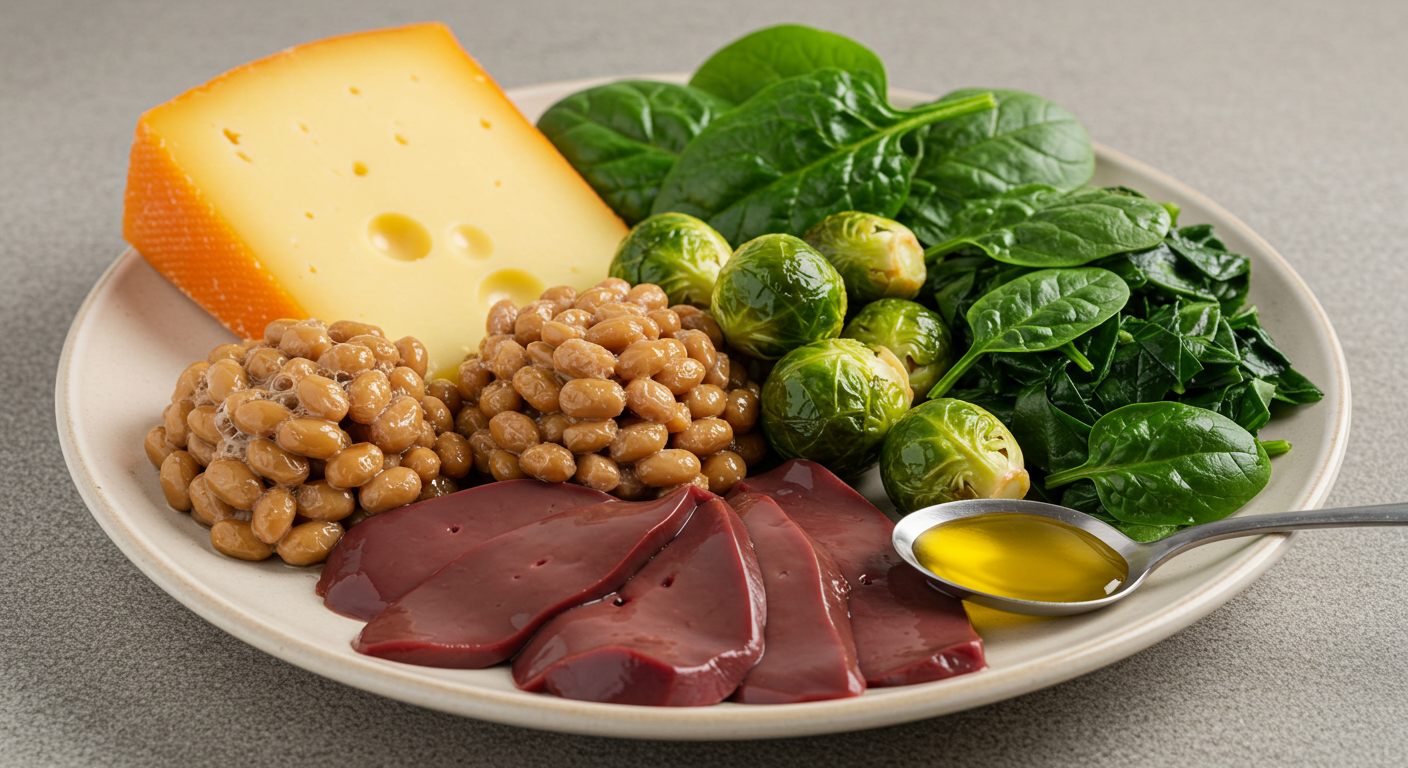Dr. Kumar’s Take:
Most people know about calcium and vitamin D for bones, but very few understand how important Vitamin K2, especially in the form MK-7, is for both heart and bone health. This review article highlights how Vitamin K2 helps guide calcium to the right places—your bones and teeth—and keeps it out of places it doesn’t belong, like your arteries.
Key Takeaways:
✔ Vitamin K2 activates proteins that prevent calcium from building up in arteries.
✔ The MK-7 form is more effective than MK-4 due to better absorption and longer half-life.
✔ Higher K2 intake is linked to reduced heart disease, fewer calcium deposits, and better bone strength.
Actionable tip:
Add foods rich in Vitamin K2—like natto, certain cheeses, or fermented foods—to your diet, or consider supplementing with MK-7 (at least 180 mcg daily) if you’re at risk of heart disease or bone loss.
Brief Summary:
This article, published in Integrative Medicine: A Clinician’s Journal, explains the important role Vitamin K2 (especially MK-7) plays in heart and bone health. It describes how Vitamin K2 activates key proteins like matrix GLA protein (MGP) and osteocalcin, which manage calcium in the body. The article reviews several human studies showing that higher intake of MK-7 is linked to less artery calcification, lower heart disease risk, and stronger bones.
Study Design:
This was a comprehensive clinical review article summarizing results from multiple human trials. Some of the most notable studies include:
- The Rotterdam Study: Found that people who consumed more than 32 mcg of Vitamin K2 daily had a 50% reduction in arterial calcification and cardiovascular risk.
- A 3-year randomized controlled trial with 244 postmenopausal women showed that 180 mcg daily of MK-7 significantly improved arterial flexibility.
- Several trials also showed improved bone strength and density with long-term MK-7 supplementation.
Results:
- Vitamin K2 (MK-7) reduced arterial stiffness in postmenopausal women.
- High K2 intake lowered the risk of heart disease and overall death in large population studies.
- Children and adults taking MK-7 had improved bone density and stronger bones.
- K2 deficiency is linked to inactive calcium-controlling proteins, leading to artery and tissue calcification.
How Vitamin K2 (MK-7) Works
Vitamin K2 is essential for activating proteins like MGP and osteocalcin. These proteins help calcium go where it’s needed (bones, teeth) and stay out of where it shouldn’t be (arteries, soft tissues). MK-7 is the most effective form because it stays in the body longer and reaches more tissues. Without enough K2, these proteins remain inactive and can’t do their job—leading to stiff arteries and weak bones.
Related Studies and Research
Vitamin K and Vascular Calcification: A Review – Investigates how vitamin K may help prevent or reverse vascular calcification.
Vitamin K2 and Cardiovascular Health: A Review – Focuses on K2’s effects on arterial elasticity and cardiovascular outcomes.
Fiber and Heart Disease Risk – Reviews how non-pharmaceutical interventions, including diet, influence cardiovascular health.
Fibrates and Cardiovascular Risk Reduction – Analyzes non-statin lipid-lowering agents and their potential intersection with vascular health strategies.
Frequently Asked Questions
What’s the difference between Vitamin K1 and K2?
Vitamin K1 helps with blood clotting and is found in leafy greens. Vitamin K2 (especially MK-7) helps manage calcium and supports heart and bone health. K2 is found in fermented foods and some animal products.
How much Vitamin K2 should I take?
Many studies used 180 mcg of MK-7 per day. Some bone health studies in children used as little as 45 mcg.
Can I get Vitamin K2 from food?
Yes, foods like natto (fermented soy), hard cheeses, and some organ meats are high in K2. But many people may not get enough from diet alone.
Is Vitamin K2 safe?
Yes, clinical studies found no major side effects, even with long-term use. If you’re on blood thinners, talk to your doctor before starting K2 supplements.
Do statins affect Vitamin K2?
Yes. Statins may reduce K2 production in the body, possibly increasing the risk of arterial calcification. Supplementing K2 could help counter this effect.
Conclusion
Vitamin K2, especially the MK-7 form, is a powerful but often overlooked nutrient that supports both heart and bone health. It works by activating proteins that guide calcium into the right places and keep it out of arteries. Research continues to grow, but what we know so far is promising: K2 could be a game-changer for aging well.
To protect your arteries and strengthen your bones, consider adding MK-7 to your daily routine—especially if you’re aging, postmenopausal, or on statins.


